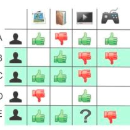Algorithm selection using Metalearning aims to find mappings between problem characteristics (i.e. metafeatures) with relative algorithm performance to predict the best algorithm(s) for new datasets. Therefore, it is of the utmost importance that the metafeatures used are informative. In Collaborative Filtering, recent research has created an extensive collection of such metafeatures. However, since these are created based on the practitioner's understanding of the problem, they may not capture the most relevant aspects necessary to properly characterize the problem. We propose to overcome this problem by taking advantage of Representation Learning, which is able to create an alternative problem characterizations by having the data guide the design of the representation instead of the practitioner's opinion. Our hypothesis states that such alternative representations can be used to replace standard metafeatures, hence hence leading to a more robust approach to Metalearning. We propose a novel procedure specially designed for Collaborative Filtering algorithm selection. The procedure models Collaborative Filtering as graphs and extracts distributed representations using graph2vec. Experimental results show that the proposed procedure creates representations that are competitive with state-of-the-art metafeatures, while requiring significantly less data and without virtually any human input.
翻译:使用 Meta Learning 选择算法是为了在问题特性(即元数据)和相对算法性能之间找到图解,以预测新数据集的最佳算法。 因此,使用元数据极为重要。 在合作过滤中,最近的研究创造了大量这类元数据。 但是,由于这些是根据从业人员对问题的理解而形成的,因此它们可能无法捕捉到问题的适当特征最相关的方面。 我们提议利用代表性学习来克服这一问题,因为这种学习能够通过数据指导代表结构的设计而不是执业者的意见来产生一个替代的问题特征。 我们的假设指出,这种替代的表示方法可以用来取代标准的元数据,从而导致一种更强有力的模型学习方法。 我们提出一个专门为合作过滤算法选择而设计的新的程序。 程序模型将协作过滤作为图表进行, 并用图2c 来提取分布的演示。 实验结果显示, 拟议的程序可以产生具有竞争性的演示, 与状态的输入和人类元数据相比, 几乎不需要数据。



